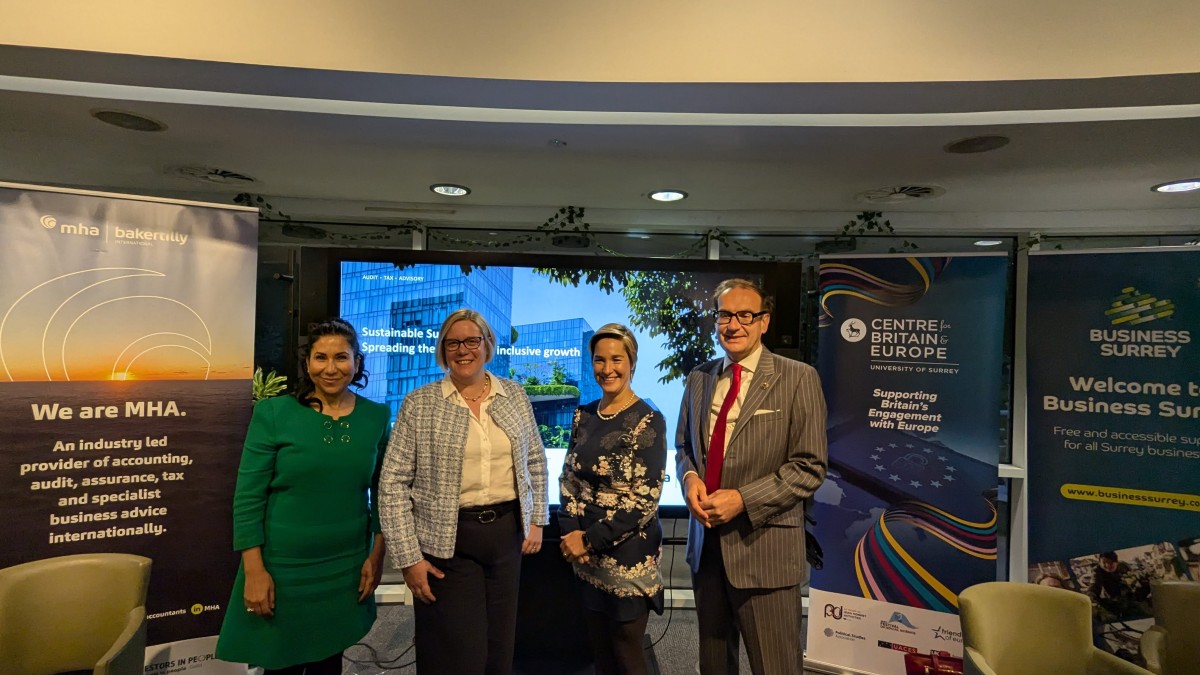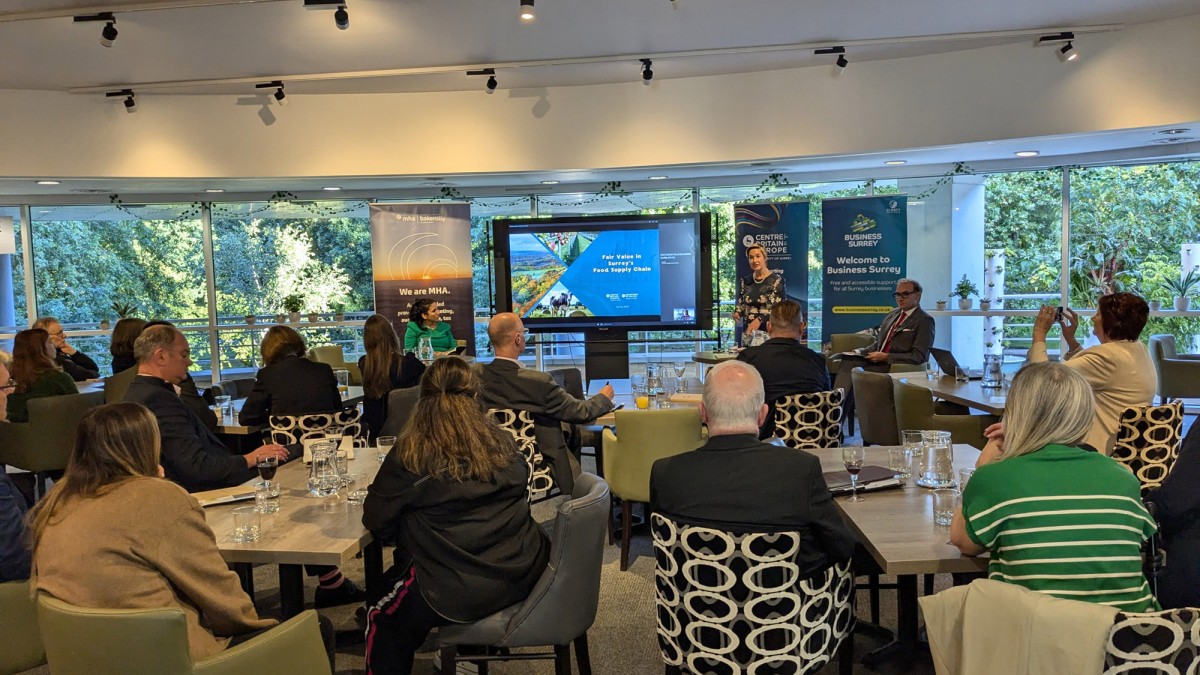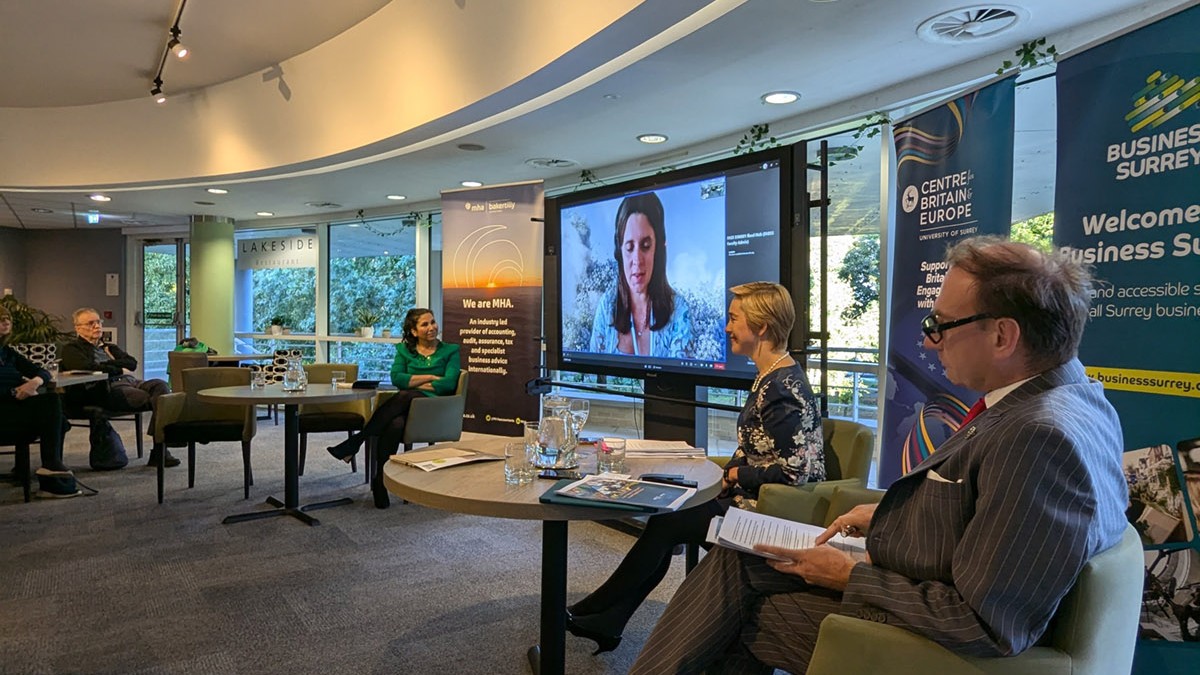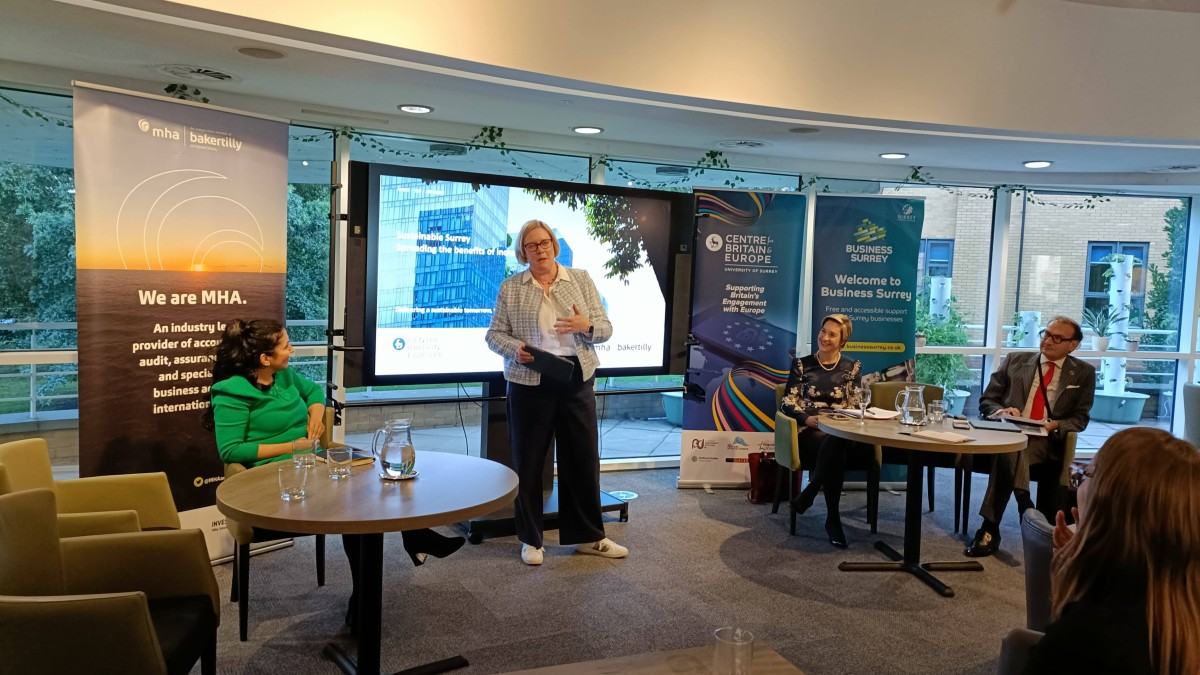Sustainable Surrey: Spreading the Benefits of Inclusive Growth
On 12 September 2024, the "Sustainable Surrey: Spreading the Benefits of Inclusive Growth" panel convened key industry leaders, policymakers, and researchers to explore the intersection of sustainability and inclusive growth as drivers of long-term economic stability.
Hosted at the University of Surrey, the event featured prominent speakers including Eman Martin-Vignerte from Bosch UK, Annie Renison from SEC Newgate, Mark Lumsdon-Taylor from MHA (independent member of Bakertilly), and Professor Amelia Hadfield from the Centre for Britain and Europe (CBE). Attendees included Surrey County Council members, business leaders, and PhD researchers.
During the event, two novel CBE reports, commissioned by the Surrey County Council and MHA, were unveiled: (1) Charting the Role of Inward Investment and Growth in Surrey, and (2) Fair Value in Surrey's Food Supply Chain.
Charting the Role of Inward Investment and Growth in Surrey
The first report discusses Surrey's inward investment landscape by addressing the challenges faced by the county. One of these is how reactionary policies fail to address the complexities of today’s globalised economy. One speaker noted that these policies often reflect a world "before the internet." Additionally, misinformation surrounding sustainability was highlighted as a significant challenge, particularly because it deters business investment. Surrey County Council representatives addressed challenges in funding distribution, especially when Local Enterprise Partnerships (LEPs) existed, where competition for resources hindered inclusive growth.
In addressing these multitiered challenges, some of the recommendations in the report include:
- Cultivation of collaboration with stakeholders
- Surrey County Council to take lead
- Create skilled worker retention initiatives
- Address infrastructure pressures
- Develop compelling Surrey brand
Eman of Bosch UK emphasised the need for a forward-thinking strategy spanning 10-15 years, citing China's success in long-term planning despite its differing political structure from Europe. The conversation shifted away from Brexit to focus on the importance of effective policy frameworks in securing resources, expanding the workforce, and fostering leadership, which echoed some of the recommendations in the report.
Key discussant, Guildford MP Zöe Franklin echoed CBE's recommendation on revitalising high streets, calling for collaboration between businesses, local government and the university, especially in the period of limited financial resources.
The suggestions in these reports offer an achievable approach to boosting Surrey’s economic growth. At the event it was clear that the University of Surrey, local government, and businesses, can work to build a brighter plan for Surrey’s economy as a county as well as recognising the unique contributions made by its boroughs, towns and villages – including Guildford. I welcome these reports.Zöe Franklin, MP for Guildford
Fair Value in Surrey's Food Supply Chain
The conversation extended to the agricultural sector, stressing that economic growth equals stability, with food production identified as crucial to sustainable development. The speakers also examined the importance of balancing sustainability with trade, investment, and tax policies.
The Government Affairs Director at Bosch also pointed to the contrasting approaches of different markets, with the UK being an early adopter of innovation, while Germany remains more conservative. This led to discussions on innovation roadmaps and the importance of creating local jobs through strategic partnerships, including collaborations with teams in China.
A key insight from the manufacturing sector revealed that its traditional focus on automotive industries has overshadowed the potential of other sectors, like agriculture. The need to shorten supply chains, utilise local suppliers, and reduce costs was revealed to be essential for meeting sustainability targets.
Some of the takeaways from the CBE’s research team on improving the food supply chain in Surrey include:
- Cost reduction via policy improvement and collaboration
- Shortening of supply chain
- Promote local suppliers
- Farming sustainably
- Improve governance
Some participants discussed the future of agriculture and the critical role of agri-tech in building sustainable models. They called for boldness in adopting emerging technologies, such as AI, positioning Surrey as a potential leader in sustainable agriculture through innovation. Local universities were identified as pivotal in driving this technological transformation. The speakers also acknowledged the societal shifts driven by AI and automation, trends that were accelerated by the COVID-19 pandemic. Managing this transition effectively is crucial to preventing job displacement and ensuring that sustainability efforts benefit all sectors.
The panel concluded that achieving inclusive growth requires bold, long-term strategies, cross-sector collaboration, and a firm commitment to sustainability through technological innovation.
The event wrapped up with a networking session, where speakers, business leaders, local government representatives, and researchers engaged in discussions that will shape future CBE events.
It's been truly wonderful to collaborate with Surrey County Council and stakeholders like the Rural Policy Group. As an anchor institution, we have a responsibility to leverage our convening power and produce evidence-based data and analysis that drive meaningful, progressive change. Together, we are not just shaping policy but ensuring that the changes we make are authentic and impactful for our community and region.Professor Amelia Hadfield, Founding Director CBE



